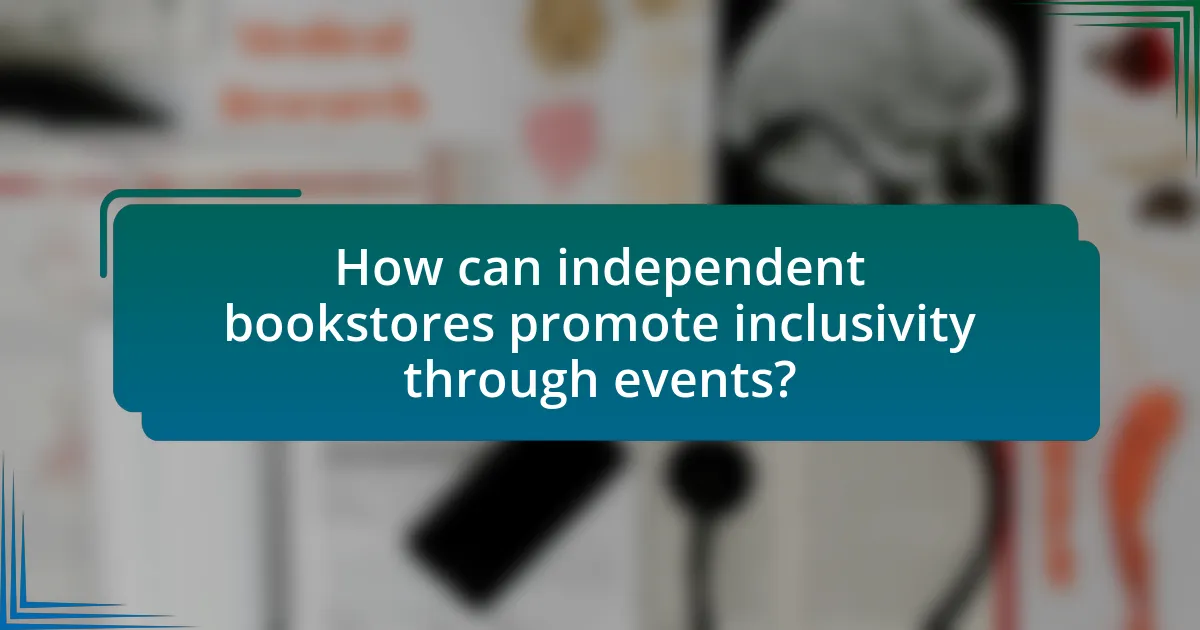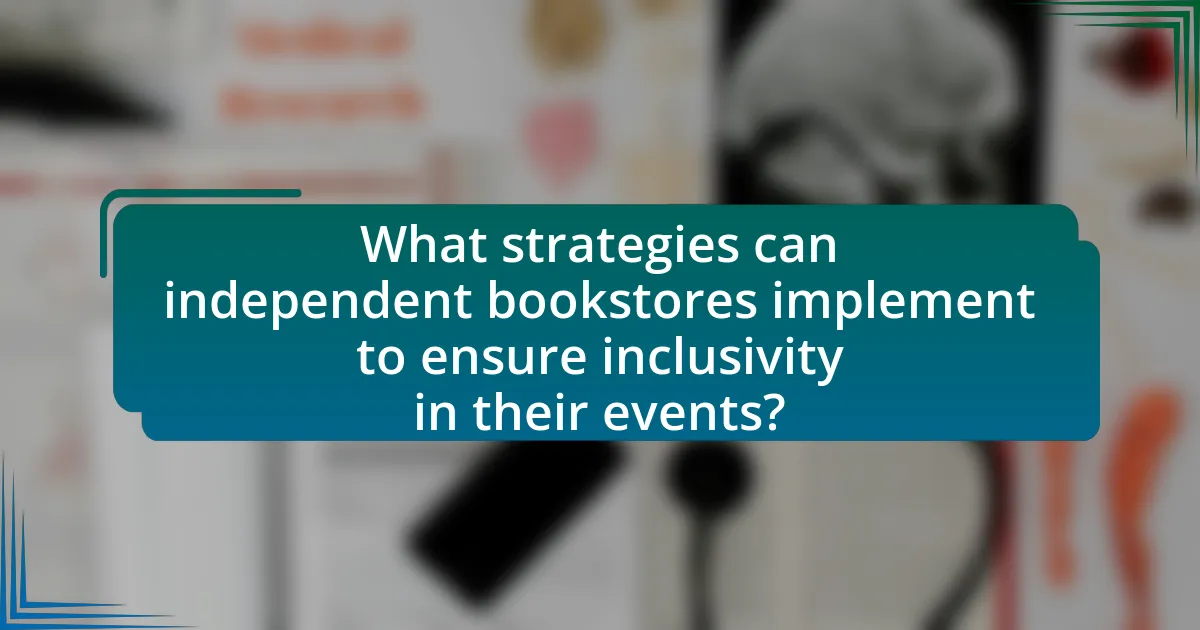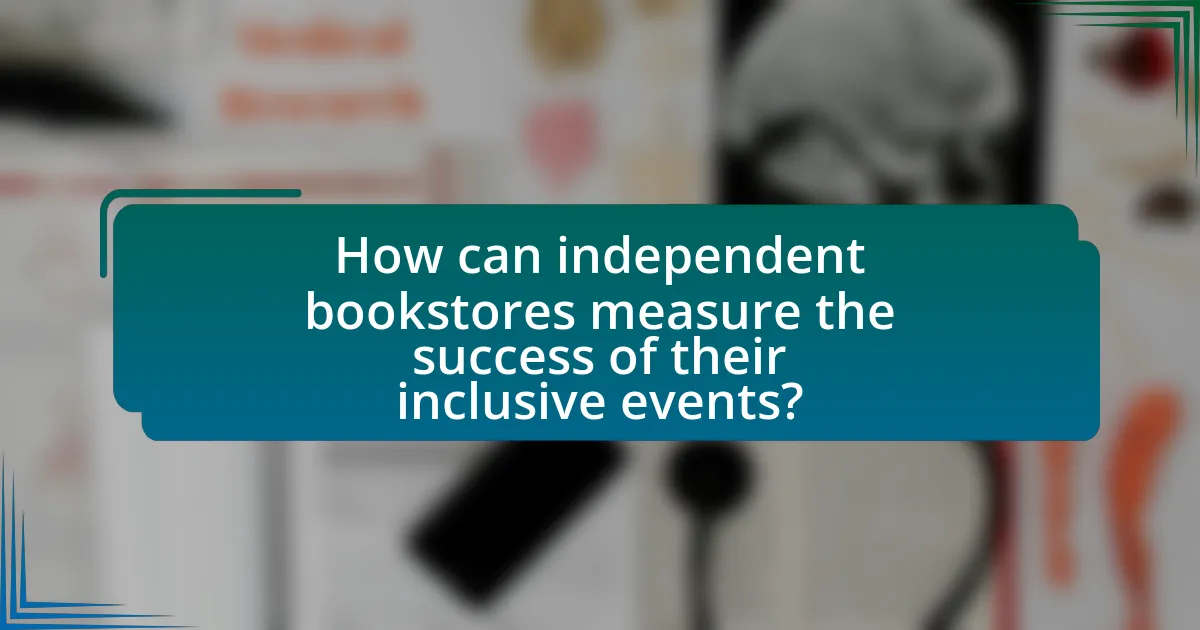Independent bookstores play a crucial role in promoting inclusivity through various events that highlight diverse voices and perspectives. This article explores how these bookstores can enhance community engagement by hosting author readings, workshops, and book clubs that cater to underrepresented groups. It discusses the importance of collaboration with local organizations, the impact of inclusive programming on customer loyalty, and strategies for measuring the success of these initiatives. Additionally, it emphasizes the significance of community feedback and ongoing staff training in fostering a welcoming environment for all attendees.

How can independent bookstores promote inclusivity through events?
Independent bookstores can promote inclusivity through events by hosting diverse author readings, workshops, and community discussions that represent various cultural, social, and identity perspectives. These events can feature authors from underrepresented backgrounds, ensuring that a wide range of voices and experiences are shared. For instance, a study by the American Booksellers Association found that events featuring diverse authors can increase community engagement and attract a broader audience, fostering a sense of belonging among different demographic groups. Additionally, bookstores can collaborate with local organizations that support marginalized communities, creating programs that address specific needs and interests, thereby reinforcing their commitment to inclusivity.
What types of events can foster inclusivity in independent bookstores?
Independent bookstores can foster inclusivity through events such as author readings featuring diverse voices, community book clubs that focus on underrepresented authors, and workshops that promote cultural awareness. These events create a welcoming environment by encouraging dialogue and understanding among different groups. For instance, hosting events that spotlight local authors from various backgrounds can enhance representation and attract a broader audience. Additionally, inclusive programming, such as LGBTQ+ themed events or multicultural festivals, can further engage diverse communities and promote a sense of belonging.
How do book clubs cater to diverse audiences?
Book clubs cater to diverse audiences by selecting a wide range of genres, themes, and authors that reflect various cultural backgrounds and perspectives. This inclusivity allows members from different demographics to engage with literature that resonates with their experiences. For instance, many book clubs prioritize reading works by authors from underrepresented communities, thereby promoting diverse voices and fostering discussions that are relevant to a broader audience. Additionally, book clubs often create a welcoming environment where members can share their unique viewpoints, enhancing the overall dialogue and understanding among participants. This approach not only enriches the reading experience but also builds a sense of community among individuals with varied backgrounds.
What role do author readings play in promoting inclusivity?
Author readings play a significant role in promoting inclusivity by providing diverse voices and perspectives that reflect a wide range of experiences. These events create a platform for underrepresented authors, allowing them to share their stories and connect with audiences who may not typically have access to such narratives. Research indicates that exposure to diverse literature fosters empathy and understanding among readers, which is essential for building inclusive communities. For instance, a study by the National Endowment for the Arts found that reading literature enhances social awareness and cultural appreciation, reinforcing the importance of author readings in fostering an inclusive literary environment.
How can workshops and classes enhance community engagement?
Workshops and classes enhance community engagement by providing interactive platforms for individuals to learn, share, and connect with one another. These events foster a sense of belonging and collaboration, as participants often engage in discussions and activities that promote social interaction. Research indicates that community-based workshops can increase social cohesion, as seen in a study by the National Endowment for the Arts, which found that participation in arts-related activities, including workshops, significantly boosts community involvement and strengthens local ties. By offering diverse topics and inclusive environments, independent bookstores can attract varied demographics, thereby enriching community dynamics and encouraging ongoing participation.
Why is it important for independent bookstores to focus on inclusivity?
It is important for independent bookstores to focus on inclusivity because it enhances community engagement and broadens their customer base. By creating an inclusive environment, independent bookstores can attract diverse audiences, fostering a sense of belonging among various demographic groups. Research indicates that businesses prioritizing inclusivity see increased customer loyalty and sales; for instance, a study by McKinsey & Company found that companies with diverse workforces are 35% more likely to outperform their competitors. This demonstrates that inclusivity not only benefits the community but also contributes to the financial success of independent bookstores.
What impact does inclusivity have on community building?
Inclusivity significantly enhances community building by fostering a sense of belonging among diverse groups. When individuals from various backgrounds feel welcomed and valued, they are more likely to engage in community activities, share their perspectives, and collaborate on initiatives. Research indicates that inclusive communities experience higher levels of social cohesion and trust, which are essential for effective collaboration and problem-solving. For instance, a study by the National Civic League found that inclusive practices in community organizations lead to increased participation and satisfaction among residents, ultimately strengthening community ties.
How does inclusivity affect the bookstore’s customer base?
Inclusivity significantly broadens a bookstore’s customer base by attracting diverse demographics. When a bookstore actively promotes inclusivity through events, it creates an environment where individuals from various backgrounds feel welcomed and represented. For instance, a study by the American Booksellers Association found that bookstores that host events catering to different cultural, social, and identity groups see a 30% increase in foot traffic compared to those that do not. This increase is attributed to the positive perception of the bookstore as a community hub that values diversity, leading to higher customer loyalty and repeat visits.

What strategies can independent bookstores implement to ensure inclusivity in their events?
Independent bookstores can implement strategies such as diversifying event programming, collaborating with local community organizations, and ensuring accessibility to foster inclusivity in their events. Diversifying event programming involves featuring authors from various backgrounds, genres, and perspectives, which can attract a wider audience and promote representation. Collaborating with local community organizations, such as cultural groups or schools, can help bookstores reach underrepresented communities and create events that resonate with diverse populations. Ensuring accessibility includes providing physical accommodations, such as wheelchair access, and offering materials in multiple languages, which can make events welcoming to all individuals. These strategies are supported by research indicating that diverse programming and community engagement significantly enhance participation and inclusivity in cultural events.
How can bookstores collaborate with local organizations to enhance inclusivity?
Bookstores can collaborate with local organizations by hosting joint events that promote diverse voices and perspectives. For instance, partnering with community groups focused on underrepresented populations can lead to book readings, discussions, and workshops that highlight various cultural narratives. This approach not only increases visibility for marginalized authors but also fosters a sense of belonging within the community. Research indicates that inclusive programming can enhance community engagement, as seen in initiatives like the “We Need Diverse Books” campaign, which emphasizes the importance of representation in literature. By actively involving local organizations, bookstores can create a more inclusive environment that resonates with a broader audience.
What partnerships can be formed with schools and community groups?
Partnerships that can be formed with schools and community groups include collaborative events, literacy programs, and educational workshops. Independent bookstores can work with schools to host book fairs, author readings, and writing contests, which promote reading and literacy among students. Additionally, community groups can partner with bookstores to organize cultural events, such as storytelling sessions or book clubs, that foster inclusivity and engagement within diverse populations. These partnerships not only enhance community ties but also support educational initiatives, as evidenced by studies showing that community involvement in education leads to improved student outcomes.
How can bookstores engage with underrepresented authors and speakers?
Bookstores can engage with underrepresented authors and speakers by hosting events specifically designed to showcase their work and perspectives. These events can include author readings, panel discussions, and workshops that highlight diverse voices and experiences. For instance, independent bookstores like Books Are Magic in Brooklyn have successfully organized events featuring authors from marginalized communities, which not only promotes their work but also fosters a sense of community and belonging. Additionally, bookstores can collaborate with local organizations that support underrepresented groups to create inclusive programming, ensuring that a wider range of voices is represented in their events. This approach not only enriches the bookstore’s offerings but also contributes to a more equitable literary landscape.
What marketing approaches can help promote inclusive events?
Utilizing targeted social media campaigns is an effective marketing approach to promote inclusive events. These campaigns can reach diverse audiences by using inclusive language, imagery, and hashtags that resonate with various communities. Research indicates that 72% of consumers are more likely to engage with brands that promote diversity and inclusion in their marketing efforts. Additionally, partnering with local organizations that represent underrepresented groups can enhance visibility and credibility, as these partnerships often lead to shared promotional efforts and increased attendance.
How can social media be utilized to reach diverse audiences?
Social media can be utilized to reach diverse audiences by leveraging targeted advertising, engaging content, and community-building strategies. Targeted advertising on platforms like Facebook and Instagram allows independent bookstores to tailor their messages to specific demographics, ensuring that promotions reach various cultural and age groups. Engaging content, such as posts that highlight diverse authors or cultural events, fosters interest and encourages sharing among different communities. Additionally, community-building strategies, such as creating groups or events that celebrate inclusivity, can enhance visibility and participation from a broader audience. According to a 2021 Pew Research study, 69% of adults in the U.S. use social media, making it a powerful tool for outreach and engagement across diverse populations.
What role does community feedback play in event planning?
Community feedback plays a crucial role in event planning by ensuring that the events meet the needs and preferences of the local audience. Engaging with community members allows event planners to gather insights on what types of events are desired, which can lead to higher attendance and satisfaction rates. For instance, a study by the National Endowment for the Arts found that community involvement in planning cultural events significantly increases participation and fosters a sense of ownership among attendees. This feedback loop not only enhances the relevance of the events but also strengthens community ties, making the events more inclusive and reflective of diverse perspectives.

How can independent bookstores measure the success of their inclusive events?
Independent bookstores can measure the success of their inclusive events by analyzing attendance numbers, participant feedback, and community engagement. Attendance numbers provide a quantitative measure of interest and reach, while participant feedback, collected through surveys or informal discussions, offers qualitative insights into the event’s impact on inclusivity. Additionally, tracking social media engagement and community interactions post-event can indicate how well the event resonated with diverse audiences. For instance, a study by the American Booksellers Association found that events with diverse programming attracted a wider demographic, highlighting the importance of inclusivity in driving attendance and engagement.
What metrics should be used to evaluate event impact?
To evaluate event impact, metrics such as attendance numbers, participant demographics, engagement levels, and post-event feedback should be used. Attendance numbers provide a quantitative measure of interest and reach, while participant demographics help assess inclusivity by revealing the diversity of attendees. Engagement levels, measured through interactions during the event (e.g., questions asked, social media mentions), indicate how well the event resonated with the audience. Post-event feedback, collected through surveys or interviews, offers qualitative insights into attendee satisfaction and perceived value, which are crucial for understanding the event’s overall impact.
How can participant feedback be collected and analyzed?
Participant feedback can be collected through surveys, interviews, and focus groups. Surveys can be distributed online or in-person, allowing participants to provide quantitative and qualitative responses about their experiences at events. Interviews offer in-depth insights, while focus groups facilitate discussions among participants, revealing diverse perspectives. Analyzing this feedback involves coding qualitative data for themes and using statistical methods for quantitative data, enabling bookstores to identify trends and areas for improvement. Research shows that systematic feedback collection and analysis can enhance event effectiveness and participant satisfaction, as evidenced by a study published in the Journal of Marketing Research, which highlights the importance of participant input in shaping successful community events.
What indicators show increased community engagement?
Indicators of increased community engagement include higher attendance at events, increased participation in discussions, and a rise in social media interactions related to the bookstore. For instance, a study by the American Booksellers Association found that independent bookstores hosting community events saw a 30% increase in foot traffic and a 25% increase in sales during those events. Additionally, tracking social media metrics, such as likes, shares, and comments on event posts, can provide quantifiable evidence of community interest and involvement.
What best practices can independent bookstores adopt for future inclusive events?
Independent bookstores can adopt several best practices for future inclusive events, such as ensuring diverse representation among authors and speakers. This approach not only reflects the community’s demographics but also enriches the event’s content and appeal. Additionally, bookstores should prioritize accessibility by providing accommodations like wheelchair access, sign language interpreters, and materials in multiple languages. Research indicates that inclusive events attract a broader audience, fostering a sense of belonging and community engagement. Furthermore, soliciting feedback from attendees about their experiences can help bookstores continuously improve their inclusivity efforts, ensuring that future events meet the diverse needs of their patrons.
How can bookstores create a welcoming environment for all attendees?
Bookstores can create a welcoming environment for all attendees by implementing inclusive practices such as diverse programming, accessible spaces, and community engagement. Diverse programming includes hosting events that reflect various cultures, identities, and interests, which can attract a broader audience and foster a sense of belonging. Accessible spaces ensure that all individuals, including those with disabilities, can navigate the bookstore comfortably; this can involve physical modifications and providing resources like seating areas and clear signage. Community engagement, through partnerships with local organizations and feedback from attendees, helps bookstores understand the needs of their community and adapt accordingly, reinforcing their commitment to inclusivity. These strategies are supported by research indicating that inclusive environments enhance customer satisfaction and loyalty, ultimately benefiting the bookstore’s success.
What ongoing training can staff receive to support inclusivity efforts?
Staff can receive ongoing training in cultural competency, implicit bias, and inclusive communication to support inclusivity efforts. Cultural competency training equips staff with the knowledge and skills to understand and respect diverse backgrounds, enhancing their ability to engage with a wide range of customers. Implicit bias training helps staff recognize and mitigate unconscious biases that may affect their interactions, fostering a more equitable environment. Inclusive communication training focuses on using language and practices that are respectful and affirming of all identities, which is essential for creating a welcoming atmosphere in independent bookstores. These training programs have been shown to improve staff awareness and customer satisfaction, ultimately contributing to a more inclusive community.


